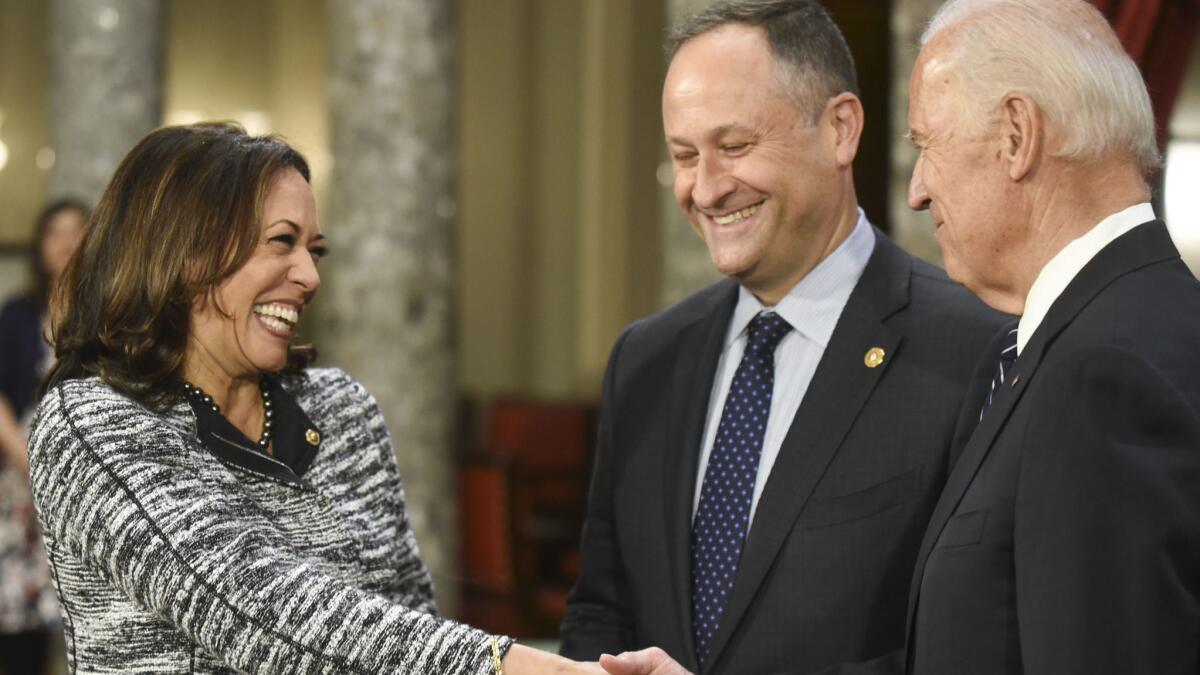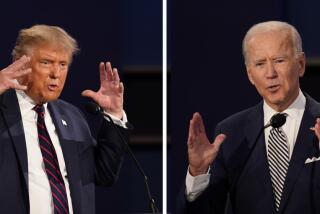Editorial: For the 2020 Democratic candidates, beating Trump has to be Job One

With former Vice President Joe Biden’s announcement that he will seek the 2020 Democratic presidential nomination, the field of would-be challengers to President Trump is complete, or nearly so. No fewer than 20 candidates are seeking the party’s nod.
It’s not only a large field but also a dizzyingly diverse one, ranging from seasoned (some would say superannuated) figures such as Biden and Sen. Bernie Sanders to senators making their first run for the White House (Kamala Harris, Amy Klobuchar, Cory Booker, Elizabeth Warren and Kirsten Gillibrand) to charismatic newcomers Pete Buttigieg, the mayor of South Bend, Ind., and former U.S. Rep. Beto O’Rourke from Texas. As the campaign unfolds, Democratic voters will be asked to choose among competing visions for the party and the country. But however that crucial contest of ideas is resolved, it’s vital that the eventual nominee be able to defeat Trump, a uniquely unfit president, and then govern in a way that eases rather than exacerbates national divisions.
There can be no doubt that four more years of a Trump presidency would be a disaster for the country. He has proved himself an incompetent and ignorant chief executive who has hemorrhaged Cabinet members and advisors, alienated U.S. allies and shown contempt for the rule of law (as was clear from the recent report by special counsel Robert S. Mueller III). Rather than appeal to what Abraham Lincoln called “the better angels of our nature,” Trump has savaged the press and his political opponents, demonized immigrants and provided rhetorical aid and comfort to brutal police officers and white nationalists.
Not only the Democratic nominee but the party itself must be seen as ‘electable’ if the country is to be spared the ordeal of a second Trump term.
So, yes, an important question for voters in next year’s Democratic primaries must be: “Can this candidate defeat Trump?” At the same time, it’s far too early in the process to make pronouncements about what exactly makes a candidate “electable.” Biden’s supporters argue that his popularity with working-class Americans would enable him to siphon voters away from Trump. A similar argument is made on behalf of Sanders, who recently suggested that Trump was betraying his 2016 campaign promise to protect U.S. workers from unfair trade deals.
Supporters of other candidates argue that they would be better able to defeat Trump by galvanizing the support of younger voters, whose enthusiastic participation in last year’s midterm helped the Democrats regain control of the U.S. House of Representatives. Others argue that the party should choose a female nominee to mobilize women voters.
So it’s far from obvious at this point who is better positioned to win. Certainly “electable” shouldn’t be regarded as a synonym for “older white male” or “centrist.” It’s possible that candidates who fit neither description will make the most effective case that they can translate enthusiasm in the primaries into a general-election victory.
And that, after all, is the point of the campaign: to find out what the candidates stand for, to determine who you agree with and to decide who you think can win. At the moment there’s a ferocious battle underway over the future Democratic Party, involving issues like race and gender and socialism and compromise and experience and generational change.
Enter the Fray: First takes on the news of the minute »
That battle doesn’t need to be self-destructive. But it will be healthier, less bitter and less divisive if all of the would-be Democratic nominees model the sort of civility and respect for opposing views that have been so lacking in the incumbent president. Democratic candidates have real differences over substantive issues — including universal healthcare, income inequality and the projection of American power abroad — and those disagreements should be fully aired during the primaries. But an unnecessarily acrimonious primary campaign, or one fixated on besmirching the character of rivals, could undermine the party’s prospects in a general election. Some contend, for example, that Hillary Clinton suffered in the 2016 general election because of defections by Sanders supporters who thought the party establishment had unfairly favored Clinton.
That’s a consideration that should apply in any campaign, but it will be especially important next year when lingering divisions among Democrats could provide an insurance policy for Trump’s reelection. Not only the Democratic nominee but the party itself must be seen as “electable” if the country is to be spared the ordeal of a second Trump term. But the long march toward the 2020 election has just begun. These 20 contenders have a long time yet to prove themselves to be the leader this country needs.
Follow the Opinion section on Twitter @latimesopinionand Facebook
More to Read
A cure for the common opinion
Get thought-provoking perspectives with our weekly newsletter.
You may occasionally receive promotional content from the Los Angeles Times.






